
"'Tis the Voice of the Lobster" is a poem by Lewis Carroll that appears in Chapter 10 of his 1865 novel Alice's Adventures in Wonderland . It is recited by Alice to the Mock Turtle and the Gryphon.

"'Tis the Voice of the Lobster" is a poem by Lewis Carroll that appears in Chapter 10 of his 1865 novel Alice's Adventures in Wonderland . It is recited by Alice to the Mock Turtle and the Gryphon.
"'Tis the Voice of the Lobster" is a parody of "The Sluggard", a moralistic poem by Isaac Watts [1] which was well known in Carroll's day. [2] [3] "The Sluggard" depicts the unsavory lifestyle of a slothful individual as a negative example. Carroll's lobster's corresponding vice is that he is weak and cannot back up his boasts, and is consequently easy prey. This fits the pattern of the predatory parody poems in the two Alice books.
As published in Alice's Adventures in Wonderland (1867):
[After the Gryphon and the Mock Turtle have sung and danced to the Lobster Quadrille, Alice mentions the poems she has attempted to recite, and the Gryphon tells Alice to stand and recite "'Tis the voice of the sluggard", which she reluctantly does] "but her head was so full of the Lobster Quadrille, that she hardly knew what she was saying ..."
'Tis the voice of the lobster; I heard him declare,
"You have baked me too brown, I must sugar my hair."
As a duck with its eyelids, so he with his nose
Trims his belt and his buttons, and turns out his toes.
[The Gryphon and the Mock Turtle interrupt with a brief exchange about what this unfamiliar version of the poem means, and then insist that Alice continue:]
I passed by his garden, and marked, with one eye,
How the owl and the oyster were sharing a pie—
[Alice's recitation is cut short by the Mock Turtle, who finds the poem "the most confusing thing I ever heard".] [4]
In 1886, Carroll wrote an altered and expanded version of the poem for the first theatrical adaptation of Alice. In this version, a panther replaces the oyster. A manuscript signed and dated 31 October 1886 reads:
'Tis the voice of the Lobster, I heard him declare
"You have baked me too brown: I must sugar my hair."
As a duck with its eyelids, so he with his nose
Trims his belt & his buttons, & turns out his toes.
When the sands are all dry, he is gay as a lark,
And will talk in contemptuous tones of the Shark:
But, when the tide rises and Sharks are around,
His voice has a timid & tremulous sound.
I passed by his garden, & marked with one eye
How the Owl & the Panther were sharing a pie:
The Panther took pie-crust, & gravy, & meat,
While the Owl got the dish as his share of the treat.
When the pie was all finished, the Owl, as a boon,
Was kindly permitted to pocket the spoon:
While the Panther received knife & fork with a growl,
And concluded the banquet by [eating the Owl]. [5]

Alice's Adventures in Wonderland is an 1865 English children's novel by Lewis Carroll, a mathematics don at the University of Oxford. It details the story of a girl named Alice who falls through a rabbit hole into a fantasy world of anthropomorphic creatures. It is seen as an example of the literary nonsense genre. The artist John Tenniel provided 42 wood-engraved illustrations for the book.
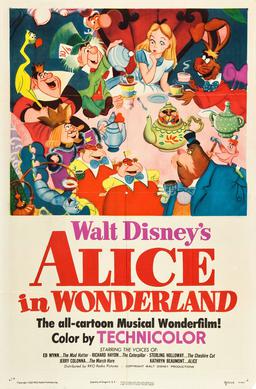
Alice in Wonderland is a 1951 American animated musical fantasy comedy film produced by Walt Disney Productions and released by RKO Radio Pictures. It is based on Lewis Carroll's 1865 novel Alice's Adventures in Wonderland and its 1871 sequel Through the Looking-Glass. The production was supervised by Ben Sharpsteen, and was directed by Clyde Geronimi, Wilfred Jackson, and Hamilton Luske. With the voices of Ed Wynn, Richard Haydn, Sterling Holloway, Jerry Colonna and Kathryn Beaumont in her film debut, the film follows a young girl, Alice, who falls down a rabbit hole and enters a nonsensical world, Wonderland, which is ruled by the Queen of Hearts, while encountering strange creatures, including the Mad Hatter and the Cheshire Cat.
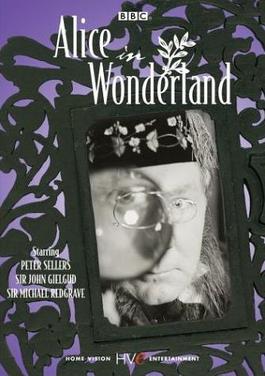
Alice in Wonderland is a 1966 BBC television play, shot on film, based on Lewis Carroll's 1865 book Alice's Adventures in Wonderland. It was adapted, produced and directed by Jonathan Miller, then best known for his appearance in the satirical revue Beyond the Fringe.
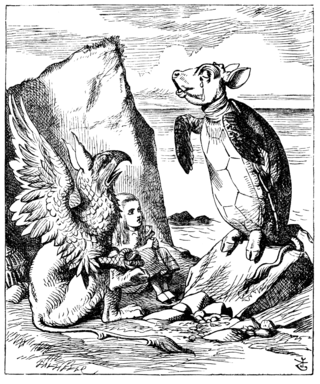
The Mock Turtle is a fictional character devised by Lewis Carroll from his popular 1865 book Alice's Adventures in Wonderland. Its name is taken from a dish that was popular in the Victorian period, mock turtle soup.
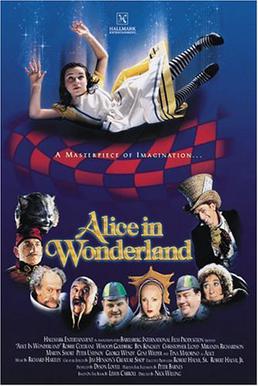
Alice in Wonderland is a 1999 made-for-television film adaptation of Lewis Carroll's books Alice's Adventures in Wonderland (1865) and Through the Looking-Glass (1871). It was first broadcast on NBC and then shown on British television on Channel 4.
"The Spider and the Fly" is a poem by Mary Howitt (1799–1888), published in 1828. The first line of the poem is "'Will you walk into my parlour?' said the Spider to the Fly." The story tells of a cunning spider who entraps a fly into its web through the use of seduction and manipulation. The poem is a cautionary tale against those who use flattery and charm to disguise their true intentions.
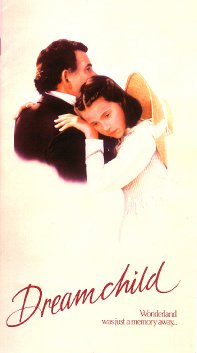
Dreamchild is a 1985 British drama film written by Dennis Potter, directed by Gavin Millar, and produced by Rick McCallum and Kenith Trodd. The film, starring Coral Browne, Ian Holm, Peter Gallagher, Nicola Cowper and Amelia Shankley, is a fictionalised account of Alice Liddell, the child who inspired Lewis Carroll's 1865 novel Alice's Adventures in Wonderland.

Alice's Adventures in Wonderland is a 1972 British musical film directed by Australian filmmaker William Sterling, based on Lewis Carroll's 1865 novel of the same name and its 1871 sequel, Through the Looking-Glass. It had a distinguished ensemble cast and a musical score composed by John Barry with lyrics written by Don Black. In addition, make-up artist Stuart Freeborn created film visuals based on the original drawings by John Tenniel from the first edition of the novel.
"How Doth the Little Crocodile" is a poem by Lewis Carroll that appears in chapter 2 of his 1865 novel Alice's Adventures in Wonderland. Alice recites it while attempting to recall "Against Idleness and Mischief" by Isaac Watts. It describes a crafty crocodile that lures fish into its mouth with a welcoming smile.

Alice in Wonderland is a musical by Henry Savile Clarke and Walter Slaughter (music), based on Lewis Carroll's books Alice's Adventures in Wonderland (1865) and Through the Looking-Glass (1871). It debuted at the Prince of Wales's Theatre in the West End on 23 December 1886. Aubrey Hopwood (lyrics) and Walter Slaughter (music) wrote additional songs which were first used for the 1900 revival.

The Gryphon is a fictional character devised by Lewis Carroll in the popular 1865 book Alice's Adventures in Wonderland. True to the conventional view of a griffin, he has the head, talons, and wings of an eagle and the body of a lion.

Alice in Wonderland is a 1949 French film based on Lewis Carroll's 1865 fantasy novel Alice's Adventures in Wonderland. Directed by Dallas Bower, the film stars Carol Marsh as Alice, Stephen Murray as Lewis Carroll, and Raymond Bussières as The Tailor. Most of the Wonderland characters are portrayed by stop-motion animated puppets created by Lou Bunin.

Alice in Wonderland is a 1915 American silent film adaptation of Lewis Carroll's classic 1865 novel, Alice's Adventures in Wonderland, directed and written by W. W. Young and starring Viola Savoy as Alice.
"You Are Old, Father William" is a poem by Lewis Carroll that appears in his 1865 book Alice's Adventures in Wonderland. It is recited by Alice in Chapter 5, "Advice from a Caterpillar". Alice informs the Caterpillar that she has previously tried to repeat "How Doth the Little Busy Bee" and has had it all come wrong as "How Doth the Little Crocodile". The Caterpillar asks her to repeat "You Are Old, Father William", and she recites it.

Almost Alice: Music Inspired by the Motion Picture is a 2010 concept album of various artists' music inspired by Tim Burton's film, Alice in Wonderland. The album is also notable for featuring songs that were inspired from quotes directly from Lewis Carroll's original 1865 novel Alice's Adventures in Wonderland. For example, both "The Lobster Quadrille" and "You Are Old, Father William" are both word-for-word performances of poems from the original Alice as quoted by the Mock Turtle and Alice herself to the Caterpillar. Furthermore, "Very Good Advice" by Robert Smith is a cover of Kathryn Beaumont's "Very Good Advice" from Disney's 1951 animated adaptation of Alice in Wonderland.

"The Mock Turtle's Song", also known as the "Lobster Quadrille", is a song recited by the Mock Turtle in Lewis Carroll's 1865 novel Alice's Adventures in Wonderland, accompanied by a dance. It was taught to him at school by his teacher called Tortoise.
"Lobster Quadrille" is the twenty-sixth episode of the third series of the 1960s cult British spy-fi television series The Avengers, starring Patrick Macnee and Honor Blackman. It was first broadcast by ABC on 21 March 1964. The episode was directed by Kim Mills and written by Richard Lucas.

Divine Songs Attempted in Easy Language for the Use of Children is a collection of didactic, moral poetry for children by Isaac Watts, first published in 1715. Though Watts's hymns are now better known than these poems, Divine Songs was a ubiquitous children's book for nearly two hundred years, serving as a standard textbook in schools. By the mid-19th century there were more than one thousand editions.
Alice in Wonderland and Through the Looking-Glass is a 2001 stage adaptation of Lewis Carroll's 1865 novel Alice's Adventures in Wonderland, and the 1871 novel Through the Looking-Glass. It was written by Adrian Mitchell. A 2 hour adaptation of both of Carroll's novels, it holds the distinction for currently being the most comprehensive stage adaptation of the books yet made, with the endings of both novels intact and only minor changes made for theatrical staging reasons.